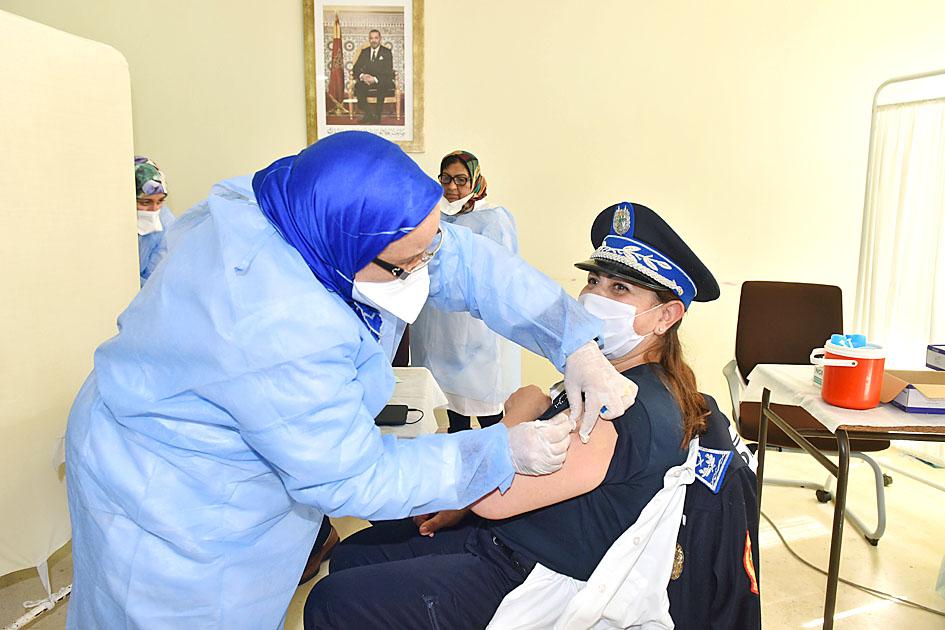Scores of Moroccan health workers streamed to a spacious white tent erected outside the Avicenne University Hospital in the capital, Rabat, to get their first dose of COVID-19 vaccines, as a mass vaccination effort began on Friday in the North African country.
The bustling vaccination center — one of 600 set up in Rabat alone — aims to inject more than 4,000 health professionals with vaccine doses within three weeks.
That is an example of the ambitious targets set by Morocco, which has one of Africa’s most advanced COVID-19 vaccination plans in place so far.

Photo: EPA-EFE
While European countries and North America started vaccinating several weeks ago, Africa is only just beginning to receive its first doses.
Moroccan King Mohammed VI received the country’s first injection on Thursday, while nationwide vaccinations began on Friday just as the country confirmed its first case of the virus variant first identified in Britain.
Among the first people to walk in to the university hospital tent was Abdelatif Asmamaa, a 58-year-old nurse who has been working on the front lines of the pandemic since March.
Before the first of his two doses was administered, Asmamaa, who has high blood pressure, was greeted by medical staff who inquired about his health status, then proceeded to inject him with the Covishield vaccine, developed by the University of Oxford and AstraZeneca.
‘It’s an exciting atmosphere,” he said, checking a document indicating when he would receive his second jab. “I feel nothing, it’s like the seasonal flu shot.”
In cubicles scattered across the tent, other nurses, doctors and Moroccan Ministry of Health personnel were getting the shots simultaneously.
Similar scenes unfolded at vaccination locations across the North African kingdom.
A government vaccine deployment plan said that about 3,000 sites would be set up in total, including mobile units that would deliver shots in remote and rural areas.
The country’s vaccine rollout initially targets those most vulnerable to the virus, including healthcare workers, security forces and other public authorities, and people aged 75 or older.
The AstraZeneca vaccine, produced by the Serum Institute of India, is one of two vaccines used by Morocco in its free immunization drive. The other is developed by China’s Sinopharm.
Both vaccines require two doses and do not need ultra-cold storage.
Morocco aims to get 66 million doses of the two vaccines, covering about 80 percent of its 35 million population.
Asked what criteria determine the shot to use, Mina Ait El Qadi, the hospital’s pharmacy director, said that it is a decision made by the government’s scientific committee.
“We don’t really have a saying in choosing which vaccine to administer,” El Qadi said. “We work with what they give us”.
Morocco has seen a drop in confirmed virus cases recently attributed to a dip in testing.

NO EXCUSES: Marcos said his administration was acting on voters’ demands, but an academic said the move was emotionally motivated after a poor midterm showing Philippine President Ferdinand Marcos Jr yesterday sought the resignation of all his Cabinet secretaries, in a move seen as an attempt to reset the political agenda and assert his authority over the second half of his single six-year term. The order came after the president’s allies failed to win a majority of Senate seats contested in the 12 polls on Monday last week, leaving Marcos facing a divided political and legislative landscape that could thwart his attempts to have an ally succeed him in 2028. “He’s talking to the people, trying to salvage whatever political capital he has left. I think it’s

Polish presidential candidates offered different visions of Poland and its relations with Ukraine in a televised debate ahead of next week’s run-off, which remains on a knife-edge. During a head-to-head debate lasting two hours, centrist Warsaw Mayor Rafal Trzaskowski, from Polish Prime Minister Donald Tusk’s governing pro-European coalition, faced the Eurosceptic historian Karol Nawrocki, backed by the right-wing populist Law and Justice party (PiS). The two candidates, who qualified for the second round after coming in the top two places in the first vote on Sunday last week, clashed over Poland’s relations with Ukraine, EU policy and the track records of their

UNSCHEDULED VISIT: ‘It’s a very bulky new neighbor, but it will soon go away,’ said Johan Helberg of the 135m container ship that run aground near his house A man in Norway awoke early on Thursday to discover a huge container ship had run aground a stone’s throw from his fjord-side house — and he had slept through the commotion. For an as-yet unknown reason, the 135m NCL Salten sailed up onto shore just meters from Johan Helberg’s house in a fjord near Trondheim in central Norway. Helberg only discovered the unexpected visitor when a panicked neighbor who had rung his doorbell repeatedly to no avail gave up and called him on the phone. “The doorbell rang at a time of day when I don’t like to open,” Helberg told television

‘A THREAT’: Guyanese President Irfan Ali called on Venezuela to follow international court rulings over the region, whose border Guyana says was ratified back in 1899 Misael Zapara said he would vote in Venezuela’s first elections yesterday for the territory of Essequibo, despite living more than 100km away from the oil-rich Guyana-administered region. Both countries lay claim to Essequibo, which makes up two-thirds of Guyana’s territory and is home to 125,000 of its 800,000 citizens. Guyana has administered the region for decades. The centuries-old dispute has intensified since ExxonMobil discovered massive offshore oil deposits a decade ago, giving Guyana the largest crude oil reserves per capita in the world. Venezuela would elect a governor, eight National Assembly deputies and regional councilors in a newly created constituency for the 160,000